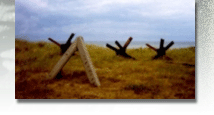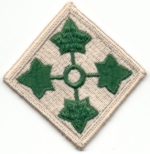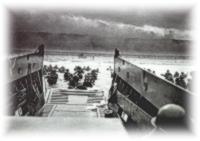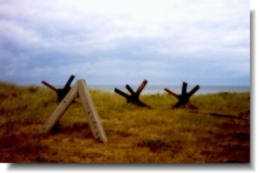Captain Tallie J Crocker, Utah Beach H-Hour+5
Once we went on board of the LCI (Landing Craft Infantry), on the third of June in the harbour of Plymouth, I gathered all my men and told them that this was the invasion and we were going to Normandy, France. The news was received with applause by the men. This was the moment we had trained for the last two or three years. That night on board of the ship we were listening to a German propaganda broadcast on the radio. "Axis Sally" was on. When she closed off she said "See you on the beaches of Normandy Monday morning"! We were of coarse very concerned by this. In the afternoon of the 4th we received word that the invasion had been postponed 24 hours and that took the worries away. We spend the time we had on board of the LCI going over the plans and the information we had received. Once we were in the middle of the Channel, there were numerous cases of seasickness. Everybody tried to cope with it in his own way at that point. When I looked out over the channel, it was full of crafts and ships of every description. There were ships as far as the eye could see. Some of the Navy vessels were firing their guns toward the beach area. It was a sight to behold. At some point after I had climbed on deck, we were told that we wouldn't go into the beach in the LCI, but that we would transfer onto three LCM's (Landing Craft Medium). This little change of plan caused some concern for me and the other officers, because we were afraid that the timing would be frustrated as well as the grouping of the men in their own outfits, as soon as they had hit the beach. Two LCM's arrived on the assigned time at our LCI, shortly followed after a third. When all men had gotten into the the landingcrafts, we set out for the beach. I think that we were told at that time that the location of landing was changed because of underwater obstacles.
In my mind it took forever before the coxwain dropped the ramp, I was starting to believe he never would, when all of a sudden it dropped. We did not had to worry about anyone stopping on the beach because it was very evident that the German artillery was not dropping further inland. It was five hours after H-hour when we ran onto Utah Beach. Since the causeway across the inundated area was not being used at the time we landed, we used that quickly to move towards our assigned area. None of my men had been killed or seriously wounded when we arrived on the beach. Moving inland on the causeway it was a sudden shock to us to see that others had not been so lucky. This was where we found the first American and German dead. |

 ICommandant van H compagnie, Heavy weapons, 12th Inf. Reg. 4th Ivy Leaf Division.
Together with a part of the staff of the second battalion, among which was the battalion commander, Lt. Col. Montelbano Tallie Crocker went on board of an LCI on June 3rd. This all took place in the harbor of Plymouth in Southern England. Mr. Crocker tells about his landing:
ICommandant van H compagnie, Heavy weapons, 12th Inf. Reg. 4th Ivy Leaf Division.
Together with a part of the staff of the second battalion, among which was the battalion commander, Lt. Col. Montelbano Tallie Crocker went on board of an LCI on June 3rd. This all took place in the harbor of Plymouth in Southern England. Mr. Crocker tells about his landing:
 In
the morning of June the 6th I climbed up on the deck of the LCI and I
was surprised to find the sky full of our planes, with wide black and
white stripes around the wings and fuselage. We had been told that we
would see to many aircraft on the first day, friend of foe, so imagine
my surprise.
In
the morning of June the 6th I climbed up on the deck of the LCI and I
was surprised to find the sky full of our planes, with wide black and
white stripes around the wings and fuselage. We had been told that we
would see to many aircraft on the first day, friend of foe, so imagine
my surprise.
 Strange but true, the seasickness seemed to vanish as the beach came into sight with shells landing thereon. We could see some landing craft and vehicles burning on the water's edge. One thing that had been drilled into all officers and non-coms had been to avoid crowding the beach for later landing personnel. That was the one thing I was thinking about when we got closer. As we neared the beach, an enemy shell landed in front of our LCM and fragments ricocheted off the ramp. At that time someone said: "This ain't Slapton Sands". Referring to a pre-invasion exercise we had participated in in April.
Strange but true, the seasickness seemed to vanish as the beach came into sight with shells landing thereon. We could see some landing craft and vehicles burning on the water's edge. One thing that had been drilled into all officers and non-coms had been to avoid crowding the beach for later landing personnel. That was the one thing I was thinking about when we got closer. As we neared the beach, an enemy shell landed in front of our LCM and fragments ricocheted off the ramp. At that time someone said: "This ain't Slapton Sands". Referring to a pre-invasion exercise we had participated in in April.